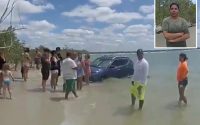Ukrainian kids kidnapped by Russia, sent to ‘re-education’ camps
Kidnapped Ukrainian children are being sent to Russian “re-education” camps — where they are kept in prison-like conditions, forced to watch Russian propaganda, beaten and subjected to sexual violence, according to parents and activists.
Inessa Vertash, 43, hasn’t seen her 15-year-old son, Vitaliy, in five months — ever since he left on what was supposed to be a two-week trip to a camp at the urging of his school teacher.
It was billed as a retreat to escape the fighting.
“I told her I wanted to think about it but she said there’s nothing to think about, they were leaving the next day and would get food five times a day and why would you keep him here where there are bombs and missiles?,” the distressed mother told the Sunday Times.
After the two weeks were up, the teen was moved to another camp, which he likened to a prison.
Vertash told the Times that her son called her crying and described his harrowing living conditions.
“There were no sheets on the beds, they were made to wear clothes of old people, given food only fit for pigs and beaten if they didn’t sing the Russian anthem,” the mom recounted.
Even more alarmingly, Vitaliy told his mother that Russian camp workers were forcing 13-year-old Ukrainian girls to have sex with them.

Vertash said she pleaded with her son’s headmistress to get him back but “eventually she disappeared” — and Vitaliy remains in captivity.
The mom’s harrowing tale is just one of many.
A report published by Yale University last month found that more than 6,000 Ukrainian children between the ages of 4 months and 17 years have been taken to 43 camps located in Russia-annexed Crimea and across mainland Russia.
But the true number of kidnapped children could be many times higher.
Daria Herasymchuk, Ukraine’s commissioner for children’s rights, told the Sunday Times that her office has so far documented 16,221 cases of child kidnappings by Russia — and even that is a conservative figure.
Herasymchuk suspects a few hundred thousand kids have been ripped away from their families as part of the Kremlin’s “Russification campaign.”

Tatiana Vlaiko’s 11-year-old daughter, Lilya, from the embattled city of Kherson, left home in September to go on what was supposed to be a two-week trip to a camp in Crimea.
“I was afraid,” the single mom said. “It’s a war and I told her, ‘It might not be so easy to get you back.’ But her friends were going and she really wanted to go.”
In sporadic phone conversations with her mother, Lilya said that everything in the camp was in Russian and the kids were being forced to sing the Russian national anthem every day.
Like Vitaliy, Lilya was transferred to another camp at the end of the two weeks, and then another, the mom told the Sunday Times.
“I called her teacher, asking, ‘What is happening, will you bring them back?’ But she stopped answering,” the mother told the publication.

Lyudmila Motychak, 44, a mom of one from Kherson, told the publication she was alarmed to hear reports of Ukrainian kids being shipped off to Russia.
But when her 15-year-old daughter, Anastasia, came home one day saying that her school was sending her class to a health camp in Crimea, Motychak said she had no choice but to go along with it.
“Anastasia was desperate to go and see the sea,” she said. “Besides, they didn’t really give us a choice or time to think.”
Anastasia and many other children were bused to the resort town of Yevpatoria on the Black Sea for what was initially billed as a two-week stay.
However, their scheduled return home kept getting pushed back — and following a month-long delay, the Russians started transferring the kids to other camps.
Anastasia, who has since been rescued, said she and her friends were not allowed out of the new camp and when on one occasion she attempted to venture outdoors, she was slapped by a teacher.
“One day they told us we would be shown a ‘cool movie,’” the girl recounted. “It turned out to be a Russian propaganda film.”

Anastasia and Lilya are among the lucky children who have returned home, thanks to the help of Save Ukraine, an organization run by Ukraine’s former children’s ombudsman, Mykola Kuleba.
Only 307 children have so far been retrieved, according to Ukraine’s commissioner for children’s rights.
Save Ukraine has rescued 164 of them, but on their last mission, their driver in Belarus was arrested, the Sunday Times reported.
Meanwhile, the Russians have been open about rehoming Ukrainian children, who have been portrayed as having been abandoned by their families.
News segments shown on Russian state TV depicted kids arriving from Ukraine being presented with teddy bears.
Maria Lvova-Belova, the Russian presidential commissioner for children’s rights, has been quoted as saying that 350 children have been adopted so far by Russian families, with a further 1,000 awaiting adoption.
Lvova-Belova herself has publicly bragged about adopting a boy from the city of Mariupol, which was seized by Russian forces last year following a bloody, months-long siege.

In a particularly brazen move, during an outdoor concert last month marking Defender of the Fatherland Day, which was attended by President Vladimir Putin, propagandists trotted out children from Mariupol and had them “thank” Ukraine’s invaders.
“Thank you, Uncle Yura, for saving me, my sister and hundreds of thousands of children in Mariupol,” 15-year-old Anna Naumeko told a crowd of 200,000 filling the Luzhniki Stadium in Moscow, referring to a Russian soldier named Yuri Gagarin.
In January, UN refugee agency chief Filippo Grandi condemned Russia for forcing thousands of Ukrainian children into adoption and forcing Russian citizenship on them.
“In the situation of war, you cannot determine if children have families or guardianship,” Grandi told BBC. “And therefore, until that is clarified, you cannot give them another nationality or having them adopted by another family.”

During a press conference on the first anniversary of the war last month, Ukrainian President Volodymyr Zelensky acknowledged the difficulty of tracking down kidnapped children deep within Russia and returning them home.
“We cannot take children back by force because we cannot enter the territory of the Russian Federation,” Zelensky said. “No global institution can do that by force either.”
The president said the only possible recourse is to exert pressure on Putin’s regime with the help of influential international organizations.
“It’s very hard,” he conceded, adding, “I don’t think we’ll be able to return 100% of the children as of now, but after our victory, children have to come back home.”


